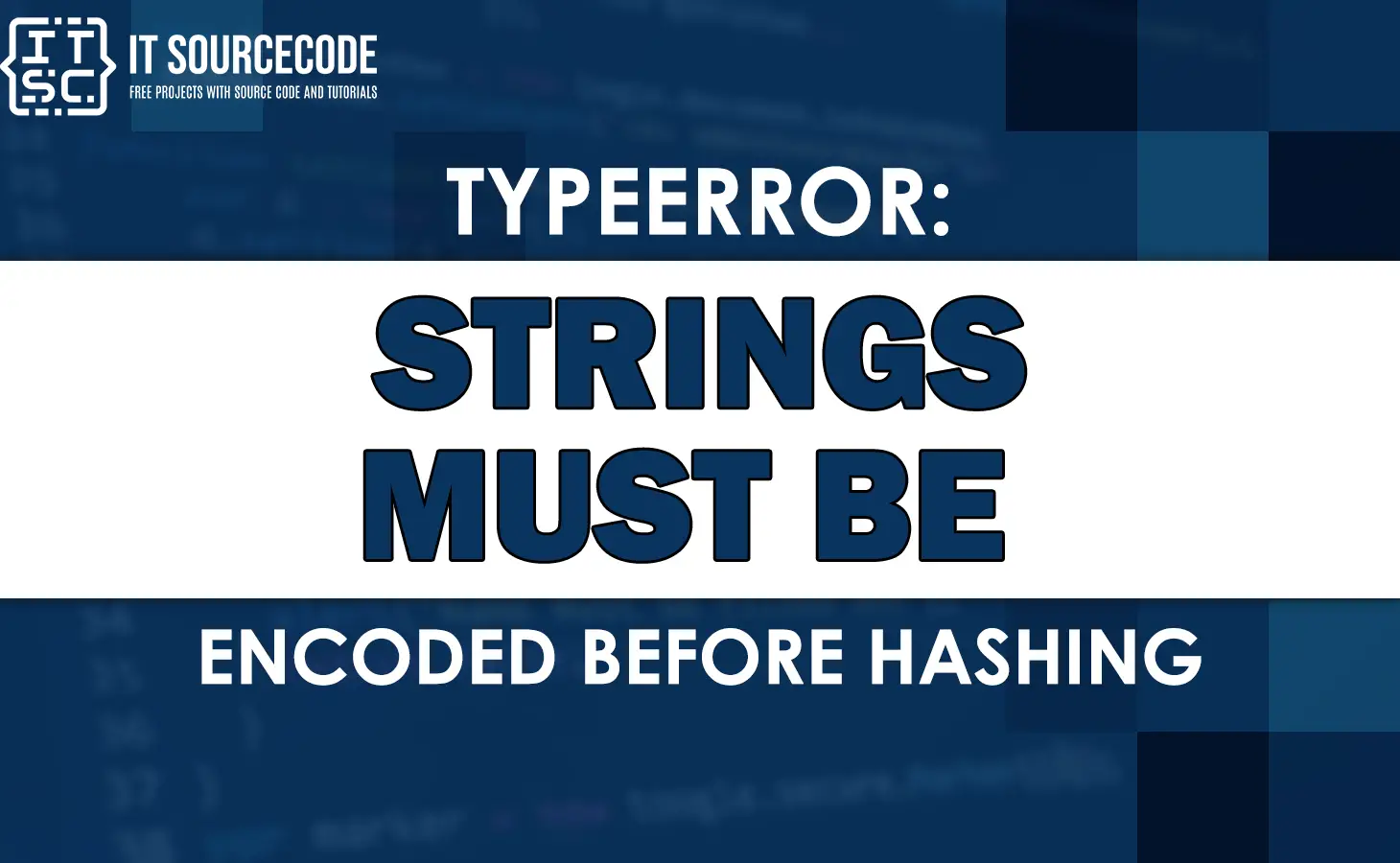Have you ever encountered a “TypeError: strings must be encoded before hashing” error while working with Python code?
This error can occur when attempting to hash a string using certain hashing algorithms, and it typically arises when the string has not been properly encoded beforehand.
This article will explain what this error message implies and how to resolve it.
What is typeerror: strings must be encoded before hashing?
It is implied by the Python error “TypeError: Strings must be encoded before hashing” that we should submit a string to a hashing algorithm.
We should utilize the encode() method to convert strings to bytes in order to correct this issue.
How to reproduce Error?
Here’s an illustration of how the error happens.
import hashlib
sampleString= 'itsourcecode.com'
my_hash = hashlib.sha256(my_str).hexdigest()
In this code, the SHA-256 hash object is created using the sha256() function. When a string is passed to it, the error results.
Output:
Traceback (most recent call last):
File “C:\Users\Windows\PycharmProjects\pythonProject1\main.py“, line 6, in
my_hash = hashlib.sha256(my_str).hexdigest()
TypeError: Strings must be encoded before hashing
Common Causes of Typeerror: Strings Must Be Encoded Before Hashing
In this section, you will know what are the reasons why we encounter this error.
Lack of Data Sanitization
Typeerrors may arise if input data is not properly sanitized. Unsanitized data could have unusual characters or formatting that prevents it from being hashed correctly.
Inconsistent Encodings
The Typeerror might be caused by mismatched encodings between the hashing function and the application. The usage of the same encoding standard by both parties must be guaranteed.
Symbols That Are Not Unicode
The hashing function may throw the Typeerror owing to incompatible formats when attempting to hash non-Unicode characters without sufficient encoding.
Incompatibility of the encoding with the hashing algorithm
Some hashing methods may have particular encoding specifications. When hashing strings, the Typeerror can occur if these conditions are not met.
Now, let’s jump on how to fix this error.
How to fix Typeerror: strings must be encoded before hashing?
Here are the solutions you can consider trying when you face the Typeerror: strings must be encoded before hashing error.
Send the hashing algorithm a bytes object.
One way to solve the error is by Passing a bytes object to the method.
Here is the example code.
import hashlib
sampleString= 'itsourcecode.com'
sampleHash = hashlib.sha256(sampleString.encode('utf-8')).hexdigest()
print(sampleHash)We utilize the str.encode method in this code, which produces an encoded version of the string as a bytes object. As a result, its default encoding is utf-8.
Output:
3b466d229fd0a3b52f771d1748f2a775cb061ae6d4243c7dff84b87273c023ed
Prefixing it with b”
Another way to fix the error is by prefixing the string with ‘b to encode bytes to an object.
Particularly, this works in a literal string and is not stored in any variable.
See the example snippet code:
import hashlib
sampleString = 'itsourecode.com'
sampleHash = hashlib.sha256(sampleString.encode('utf-8')).hexdigest()
print(sampleHash)Output:
85c7ea999cc883f17857d3f1672b520c5be1195436044332fb0dc40aab8cbfae
As you can see, since we have a bytes object, we don’t need to utilize the str.encode() method.
In the first example, a string is utilized.
In order to transform the string to bytes for the call to the sha256() method, we had to use the str.encode() method.
import hashlib
sampleString = 'itsourcecode.com'
sampleHash = hashlib.sha256(sampleString.encode('utf-8')).hexdigest()
print(sampleHash)The second example code, on the other hand, employs a bytes object (note the b” prefix). in order for the sha256() method to receive a direct pass.
import hashlib
sampleBytes = b'itsourcecode.com'
sampleHash = hashlib.sha256(sampleBytes).hexdigest()
print(sampleHash)Use the functions digest() and hexdigest()
Another way of fixing the error is also to utilized digest() and hexdigest() functions.
This is used to digest the concatenation of the data fed in the hash object.
Here is the example code using the digest() method.
import hashlib
sampleString1 = 'IT'
sampleString2 = 'SOURCECODE'
sampleHash = hashlib.sha256()
sampleHash.update(sampleString1.encode('utf-8'))
sampleHash.update(sampleString1.encode('utf-8'))
print(sampleHash.digest())
print(sampleHash.hexdigest())
Output:
b’7^\xd8\xc1\xd9\x107\xd0\xdc\x8c\x96\xf4\x14@\xfc\x93\xea\xf3siNA\x07\xc7~\xc2\xce\r\x95n’
375ed8c12ad91037d0dc8c96f41440fc93eaf373694e4107c77ec2ce0d2a956e
Alternatively, we can also prefix the literal strings using ‘b in converting them to bytes.
import hashlib
sampleBytes = b'itsourcecode'
sampleString = hashlib.sha256(sampleBytes).hexdigest()
print(sampleString)
Output:
6e74468dde3877f0893d99a5b0ab0f4bcb2d93e269d75715cd36b8d13ea8876c
Determine the kind of object that a variable stores
This time, we can use the built-in type() class if we are not sure what type of object a variable stores.
samplebBytes = 'Itsourcecode'.encode('utf-8')
print(type(samplebBytes))
# 📌 True
print(isinstance(samplebBytes, bytes))
sampleString = 'WELCOME'
# 📌 <class 'str'>
print(type(sampleString))
# 📌 True
print(isinstance(sampleString, str)) If the provided-in object is an instance or a subclass of the class which was passed in, the isinstance() function will then return TRUE.
Output:
<class 'bytes'> True <class 'str'> True
Tips to avoid getting type errors
- Avoid using the built-in data types in Python in the wrong way.
- Verify or confirm the kinds of your variables at all times.
- Be clear and concise when writing code.
- Handle the error by using try-except blocks.
- Use the built-in functions of Python if needed.
Anyway, we also have a solution for Typeerror: cannot perform reduce with flexible type errors, you might encounter.
Conclusion
To conclude, error Typeerror: strings must be encoded before hashing occurs when we pass a string to a hashing algorithm.
To fix the error, we should use encode() method in encoding strings to bytes.
By following the given solutions above, surely the error will be fixed.
That is all for this article. We hope you have learned from this.
Thank you! 😊


